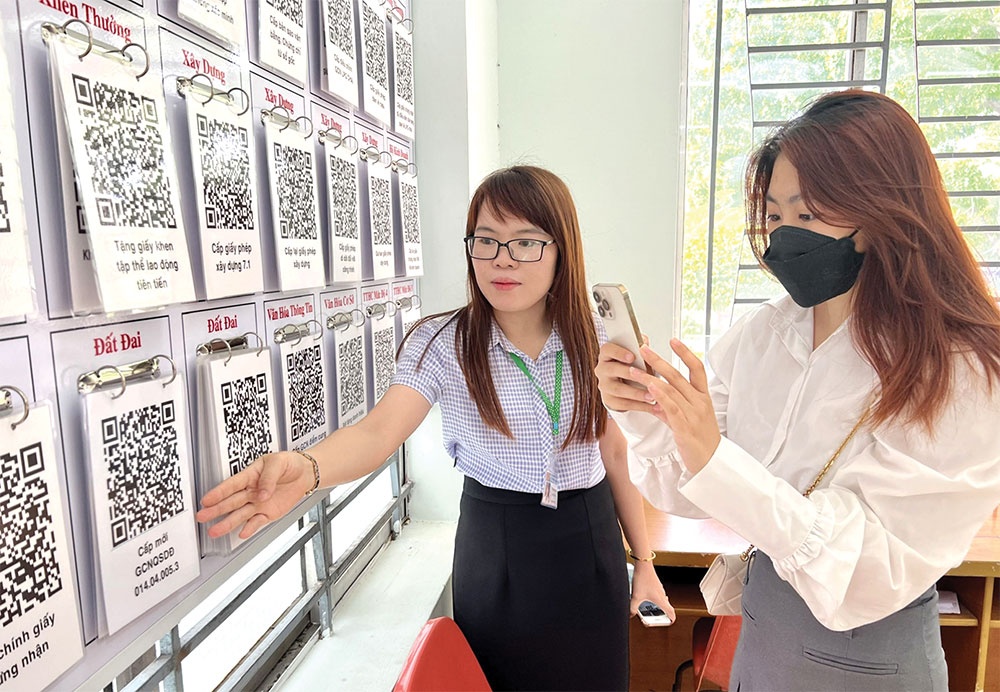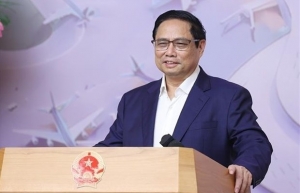Businesses baulk at admin procedural bottlenecks
While the National Assembly hall heats up day by day over the question of how to quickly recover businesses, numerous businesses are struggling financially and getting desperate.
 |
| In recent times, Vietnam has been attempting to simplify procedures and digitalise admin issues across all walks of life |
At the end of May, Hoang Hai, representative of Viet An Co., Ltd. in the central province of Nghe An, contacted the provincial tax department, asking for support related to the tax refund of tapioca.
“We have contacted authorities and been told to keep waiting,” he said. “The answer they gave us was to wait for the direction of the General Department of Taxation (GDT).”
Hoang Hai and a representative of the Vietnam Cassava Association have been proposing a VAT refund for more than a year. Last November, GDT deputy director-general Vu Chi Hung replied that he would talk to tax departments that had problems with enterprises like cassava starch exporters and timber enterprises.
Since then, Viet An company has completed all requirements of relevant agencies and is working with the economic police department in Nghe An to ensure the export of cassava starch by the company complies with the law.
Nghe An Tax Department has told Hai that the reason why his company has not yet been refunded tax is that they cannot verify whether their materials come from China or not.
“The GDT should base action on the actual situation of import and export of agricultural products in the Vietnam-China border area. If the enterprise is proven to violate rules, we will take all responsibilities and fines,” said Hai.
Verification struggles
In similar woes, An Phat Global Import-Export Trading JSC has been dealing in cassava starch for a decade. The company had already carried out over 30 VAT refund periods successfully, but by February 2020 the process was delayed, even though the process itself was identical. During that time, the company exported well over 12,000 tonnes of tapioca starch to China, with the amount of tax refund sitting at nearly VND12 billion ($500,000).
“After 31 VAT refund periods, businesses were not found to have violated anything, so we do not known why at the end of 2019 Hanoi Tax Department asked for Chinese customers to be verified with Chinese tax authorities,” Pham Minh Khoa, director of An Phat said.
Meanwhile, according to the regulations on conditions for tax deduction and tax refund, there is no requirement to verify foreign customers’ information and match with Vietnamese exporters, Khoa explained. He had provided all relevant dossiers to tax and public security authorities as before.
Vu Manh Cuong, director of the GDT’s Tax Audit and Inspection Department, said that after exporting through Vietnam’s customs border gates, they often throw away export documents and use permits for Chinese border residents that are exempt from taxes.
“This is a form of business under the border policy that the Chinese government applies to border residents. Every day, they can buy goods at the border areas worth not more than ¥8,000 ($1,100) for the consumption of border residents without paying taxes,” said Cuong.
Khoa asked why Hanoi Tax Department bases decisions on the information of Chinese enterprises to not refund tax to Vietnamese counterparts, when the tax authorities believe that Chinese enterprises take advantage of the incentives of the border policy to cover up violations.
In March, An Phat received a letter from Hanoi Public Security Department to verify that its goods were exported exclusively via border gates at the correct volume and value, according to the tax refund request of the company. However, to date, the company has not received any further feedback from Hanoi Tax Department.
Other companies have been waiting patiently for VAT refund dossiers. For the last few months, the Vietnam Timber and Forest Product Association (Vifores) has also been attentive to the opinions of member enterprises. Although a prime ministerial deadline has passed to solve this issue, there is still no specific information from the GDT or local tax departments on the matter.
Limited compliance
The latest Provincial Competitiveness Index released in April reported the continued improvement in the handling of administrative procedures over time, but firms still claim troubles in certain key areas. Of these, administrative procedures related to taxes and fees are the most troublesome.
“Among businesses encountering difficulties in complying with tax administrative procedures, those reporting problems with tax finalisation accounted for the largest proportion (49 per cent), followed by that of tax exemption and reduction, and tax refund (29 per cent),” the report highlighted. “The troublesome procedures related to taxes and fees resulted not only from firms’ limited compliance with new regulations but also from other tax management activities.”
More notably, 53.8 per cent of surveyed firms agreed that negotiations on payable taxes with provincial tax officers are a necessary part of doing business, which is higher than in 2021 (47.6 per cent). The percentage of firms reporting payment of informal charges to tax officials in the past year also rose dramatically, from 33.8 per cent in 2021 to 54.5 per cent in 2022.
On the first day of June, Prime Minister Pham Minh Chinh issued Official Dispatch No.493/TTg-KSTT requesting ministries, sectors, and localities to continue to strongly and drastically promote administrative procedure reform, and improve the business environment practically and effectively.
The official dispatch stated that authorities at all levels have made efforts to reform administrative procedures in association with national digital transformation to reduce administrative regulations, compliance costs, and improve the quality of public service provision.
Since 2021, ministries have reduced and simplified more than 2,200 business regulations in 177 legal documents, and the PM has approved the plan to reduce and simplify more than 1,100 regulations related to business activities, and provided more than 4,400 public services online on the National Public Service Portal.
As of May 2023, the total number of administrative procedures of the whole country is 6,422, a decrease of 376 procedures on-year.
However, administrative procedures in some areas still remain unsatisfactory, being a barrier to production and business. Internal administrative procedures have not been reviewed and reduced. The settlement of administrative procedures is still delayed and remaining bottlenecks in implementation; and the publicity and transparency of administrative procedures and provision of quality online public services are still limited.
To continue drastically reforming administrative procedure and effectively improving the business environment, the PM requires ministers, heads of ministerial-level agencies, and chairs of people’s committees to urgently review, cut, and simplify regulations and administrative procedures related to investment, production, and business.
At least 20 per cent of compliance costs will have to cut down according to the government’s direction since 2020.
The Ministry of Planning and Investment shall assume the prime responsibility for enhancing the business environment and national competitiveness under the direction of the government, and review and submit to the PM a plan reducing and simplifying regulations and administrative procedures related to the implementation of public investment and projects.
These all should be completed and submitted to the PM for approval before September 30.
 | PM urges streamlining administrative procedures, paving way for transport projects Prime Minister Pham Minh Chinh asked ministries, agencies and localities to work harder in order to pave way for transport projects, saying administrative procedures should be streamlined, while concluding a meeting of the State steering committee for national key transport projects in Hanoi on April 12. |
 | Hanoi to make clear administrative procedures in environment area The Hanoi Department of Natural Resources and Environment will hold a dialogue with organisations and individuals on the administrative procedures in the field of environment in July, according to director of the department Nguyen Huy Cuong. |
What the stars mean:
★ Poor ★ ★ Promising ★★★ Good ★★★★ Very good ★★★★★ Exceptional
Related Contents
Latest News
More News
- State corporations poised to drive 2026 growth (February 03, 2026 | 13:58)
- Why high-tech talent will define Vietnam’s growth (February 02, 2026 | 10:47)
- FMCG resilience amid varying storms (February 02, 2026 | 10:00)
- Customs reforms strengthen business confidence, support trade growth (February 01, 2026 | 08:20)
- Vietnam and US to launch sixth trade negotiation round (January 30, 2026 | 15:19)
- Digital publishing emerges as key growth driver in Vietnam (January 30, 2026 | 10:59)
- EVN signs key contract for Tri An hydropower expansion (January 30, 2026 | 10:57)
- Vietnam to lead trade growth in ASEAN (January 29, 2026 | 15:08)
- Carlsberg Vietnam delivers Lunar New Year support in central region (January 28, 2026 | 17:19)
- TikTok penalised $35,000 in Vietnam for consumer protection violations (January 28, 2026 | 17:15)

 Tag:
Tag:




















 Mobile Version
Mobile Version